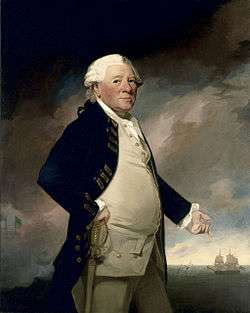Sir Hyde Parker, 5th Baronet
| Sir Hyde Parker, Bt | |
|---|---|
 Portrait of Admiral Sir Hyde Parker, 5th Bt (1714–1782) by George Romney, painted c. 1782 | |
| Born | 25 February 1714 |
| Died | 1782 (aged 67–68) |
| Allegiance |
|
| Service/branch |
|
| Rank | Vice Admiral |
| Battles/wars |
Seven Years' War American War of Independence |
Vice-Admiral Sir Hyde Parker, 5th Baronet (25 February 1714 – 1782) was a British naval commander.
Parker was born at Tredington (which was then in Worcestershire). His father, a clergyman, was a son of Sir Henry Parker. His paternal grandfather had married a daughter of Alexander Hyde, Bishop of Salisbury. He began his career at sea in the merchant service. Entering the Royal Navy at the age of 24, he was made lieutenant in 1744, and in 1748 he was made post-captain.[1]
Seven Years War
During the latter part of the Seven Years' War he served in the East Indies, taking part in the capture of Pondicherry in 1761 and of Manila in 1762.[1] In the latter year Parker with two ships captured one of the valuable Spanish plate ships in her voyage between Acapulco and Manila.
American War of Independence
In 1778 he became Rear-Admiral and went to North American waters as second-in-command.[1] For some time before George Rodney's arrival he was in command on the Leeward Islands station, and conducted a skilful campaign against the French at Martinique.[1]
In 1781, having returned home and become Vice-Admiral, he fell in with a Dutch fleet of about his own force, though far better equipped, near the Dogger Bank on 5 August 1781. After a fiercely contested battle, in which neither combatant gained any advantage, both sides drew off. Parker considered that he had not been properly equipped for his task, and insisted on resigning his command.[1]
In 1782 he accepted the East Indies command, though he had just succeeded to the family baronetcy.[1] On the outward voyage his flagship Cato was lost with all on board.[1]
He was succeeded by his older son Harry, the sixth Baronet. Parker's second son was Admiral Sir Hyde Parker (1739–1807).
Notes
References
-
 This article incorporates text from a publication now in the public domain: Chisholm, Hugh, ed. (1911). "Parker, Sir Hyde". Encyclopædia Britannica (11th ed.). Cambridge University Press.
This article incorporates text from a publication now in the public domain: Chisholm, Hugh, ed. (1911). "Parker, Sir Hyde". Encyclopædia Britannica (11th ed.). Cambridge University Press.
| Baronetage of England | ||
|---|---|---|
| Preceded by Henry Parker |
Baronet (of Melford Hall) 1782 |
Succeeded by Harry Parker |